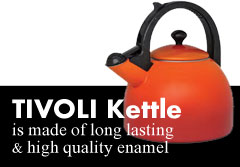FAQ TIVOLI
How do I clean my hard-anodized aluminum cookware?
- Make sure the cookware is left to cool before washing. Unless otherwise stated, wash the cookware by hand using warm water with a mild liquid dishwashing detergent and soft sponge. If needed, soaking the cookware in hot water with liquid detergent to loosen the dirt before cleaning it with a soft sponge also helps to remove burnt on spot. Stains and grease that is not immediately cleaned might result in the aforementioned dirt to be more resistant to standard cleaning procedure and become a permanent cosmetic flaw on the cookware.
- Impact bonded cookware is made by bonding aluminum on the bottom of the cookware. This allows for enhanced heat transfer.
- Most TIVOLI cookware is suitable for a flat stovetop. An ideal cookware should be stainless steel, hard anodized or enamel exterior. Copper based cookware is not recommended to be used on such stove. Cookware which does not have flat round bottom such as ridged grill pan or rounded bottom wok should not be used. When handling cookware, do not drag it across the stove; instead lift it up, to prevent scratches on the stove top.
- Nonstick coating is made out of synthetic polymer namely PTFE (Polytetrafluoroethylene) which has is resistant to wear as well as promoting heat conductivity. Nonstick coating is applied to increase the useful life and quality of TIVOLI cookware.
- PFOA stands for Perfluorooctanoic acid; it is a stable synthetic of perfluorinated carboxylic acid and fluorosurfactant. PFOA is used as a catalyst to bond the nonstick coating of the cookware’s interior and it will evaporate when the product is finished from the production line.
- Under normal use, the nonstick coating of TIVOLI coating should not chip or peel. For more information on how to properly care for your cookware please refer to our Use and Care.
- The nonstick coating of TIVOLI cookware is safe. TIVOLI cookware has undergone and complies with all the necessary food contact surface tests, including the United States Food and Drug Administration (FDA) food contact surfaces test.
- Teflon® is the registered brand name for polytetrafluoroethylene (PTFE) Nonstick coating of DuPont. The polytetrafluoroethylene-based nonstick finished of TIVOLI cookware, however, is not Teflon.
- We recommend that you use cooking spray only on TIVOLI Stainless Steel or Enamelware cookware without nonstick. To ensure that the useful life of nonstick cookware is maintained, we do not recommend cooking spray as it contains chemical propellant that tends to burn and carbonize easily unto nonstick cookware. If you wish to use less oil in your cooking, you can try wiping a paper towel with a bit of oil unto the cookware.
- Usually this is cause by leftover food residue from previous use of the pan. This residue formed from the natural oils in the food and to remove it, let the pan to soak for sometime in hot water with liquid dishwashing detergent and then scrub the cookware with a mild dishwashing detergent and toweling it dry.
- Nonstick surfaces are chemically inert; thus, most food which reacts with metal cooking surfaces will not react with nonstick. We recommend that you use nonstick cookware if you regularly cook dishes that are high in acids, alkali, salts, vinegar, tomatoes, etc.
- We do not recommend heating up your cookware up to the directed temperature setting. In addition, preheating pans on high heat or boiling dry cookware as it will damage the interior of the cookware. If you own a pet bird, we recommend that you follow additional safety procedures. Birds are known to have delicate respiratory system. They are susceptible to cigarette smoke, steam and also grease fumes from normal cooking. We suggest that you keep your pet birds out of the cooking area; do not leave cookware on the hob unattended; do not overheat cookware and ensure that kitchen is properly ventilated when cooking.


You are here:
home > faq




